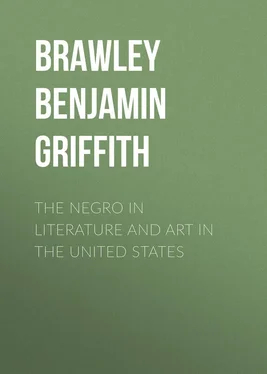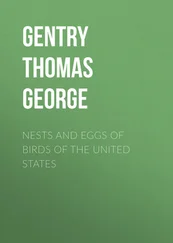Benjamin Brawley - The Negro in Literature and Art in the United States
Здесь есть возможность читать онлайн «Benjamin Brawley - The Negro in Literature and Art in the United States» — ознакомительный отрывок электронной книги совершенно бесплатно, а после прочтения отрывка купить полную версию. В некоторых случаях можно слушать аудио, скачать через торрент в формате fb2 и присутствует краткое содержание. ISBN: , Жанр: Историческая проза, foreign_antique, foreign_prose, foreign_language, на английском языке. Описание произведения, (предисловие) а так же отзывы посетителей доступны на портале библиотеки ЛибКат.
- Название:The Negro in Literature and Art in the United States
- Автор:
- Жанр:
- Год:неизвестен
- ISBN:http://www.gutenberg.org/ebooks/35063
- Рейтинг книги:5 / 5. Голосов: 1
-
Избранное:Добавить в избранное
- Отзывы:
-
Ваша оценка:
- 100
- 1
- 2
- 3
- 4
- 5
The Negro in Literature and Art in the United States: краткое содержание, описание и аннотация
Предлагаем к чтению аннотацию, описание, краткое содержание или предисловие (зависит от того, что написал сам автор книги «The Negro in Literature and Art in the United States»). Если вы не нашли необходимую информацию о книге — напишите в комментариях, мы постараемся отыскать её.
The Negro in Literature and Art in the United States — читать онлайн ознакомительный отрывок
Ниже представлен текст книги, разбитый по страницам. Система сохранения места последней прочитанной страницы, позволяет с удобством читать онлайн бесплатно книгу «The Negro in Literature and Art in the United States», без необходимости каждый раз заново искать на чём Вы остановились. Поставьте закладку, и сможете в любой момент перейти на страницу, на которой закончили чтение.
Интервал:
Закладка:
The Negro in Literature and Art in the United States
PREFACE
The present volume undertakes to treat somewhat more thoroughly than has ever before been attempted the achievement of the Negro in the United States along literary and artistic lines, judging this by absolute rather than by partial or limited standards. The work is the result of studies in which I first became interested nearly ten years ago. In 1910 a booklet, "The Negro in Literature and Art," appeared in Atlanta, privately printed. The little work contained only sixty pages. The reception accorded it, however, was even more cordial than I had hoped it might be, and the limited edition was soon exhausted. Its substance, in condensed form, was used in 1913 as the last chapter of "A Short History of the American Negro," brought out by the Macmillan Co. In the mean time, however, new books and magazine articles were constantly appearing, and my own judgment on more than one point had changed; so that the time has seemed ripe for a more intensive review of the whole field. To teachers who may be using the history as a text I hardly need to say that I should be pleased to have the present work supersede anything said in the last chapter of that volume.
The first chapter, and those on Mr. Braithwaite and Mrs. Fuller, originally appeared in the Southern Workman . That on the Stage was a contribution to the Springfield Republican ; and the supplementary chapter is from the Dial . All are here reprinted with the kind consent of the owners of those periodicals. Much of the quoted matter is covered by copyright. Thanks are especially due to Mr. Braithwaite and Mr. J. W. Johnson for permission to use some of their poems, and to Dodd, Mead & Co., the publishers of the works of Dunbar. The bibliography is quite new. It is hoped that it may prove of service.
Benjamin Brawley.North Cambridge, August, 1917.
I
THE NEGRO GENIUS
IN his lecture on "The Poetic Principle," in leading down to his definition of poetry, Edgar Allan Poe has called attention to the three faculties, intellect, feeling, and will, and shown that poetry, that the whole realm of aesthetics in fact, is concerned primarily and solely with the second of these. Does it satisfy a sense of beauty? This is his sole test of a poem or of any work of art, the aim being neither to appeal to the intellect by satisfying the reason or inculcating truth, nor to appeal to the will by satisfying the moral sense or inculcating duty.
The standard has often been criticised as narrow; yet it embodies a large and fundamental element of truth. If in connection with it we study the Negro we shall find that two things are observable. One is that any distinction so far won by a member of the race in America has been almost always in some one of the arts; and the other is that any influence so far exerted by the Negro on American civilization has been primarily in the field of aesthetics. To prove the point we may refer to a long line of beautiful singers, to the fervid oratory of Douglass, to the sensuous poetry of Dunbar, to the picturesque style of DuBois, to the mysticism of the paintings of Tanner, and to the elemental sculpture of Meta Warrick Fuller. Even Booker Washington, most practical of Americans, proves the point, the distinguishing qualities of his speeches being anecdote and brilliant concrete illustration.
Everyone must have observed a striking characteristic of the homes of Negroes of the peasant class in the South. The instinct for beauty insists upon an outlet, and if one can find no better picture he will paste a circus poster or a flaring advertisement on the walls. Very few homes have not at least a geranium on the windowsill or a rosebush in the garden. If also we look at the matter conversely we shall find that those things which are most picturesque make to the Negro the readiest appeal. Red is his favorite color simply because it is the most pronounced of all colors. Goethe's "Faust" can hardly be said to be a play primarily designed for the galleries. One never sees it fail, however, that in any Southern city this play will fill the gallery with the so-called lower class of Negro people, who would never think of going to another play of its class, but different; and the applause never leaves one in doubt as to the reasons for Goethe's popularity. It is the suggestiveness of the love scenes, the red costume of Mephistopheles, the electrical effects, and the rain of fire that give the thrill desired – all pure melodrama of course. "Faust" is a good show as well as a good play.
In some of our communities Negroes are frequently known to "get happy" in church. Now a sermon on the rule of faith or the plan of salvation is never known to awaken such ecstasy. This rather accompanies a vivid portrayal of the beauties of heaven, with the walls of jasper, the angels with palms in their hands, and ( summum bonum! ) the feast of milk and honey. And just here is the dilemma so often faced by the occupants of pulpits in Negro churches. Do the people want scholarly training? Very often the cultured preacher will be inclined to answer in the negative. Do they want rant and shouting? Such a standard fails at once to satisfy the ever-increasing intelligence of the audience itself. The trouble is that the educated minister too often leaves out of account the basic psychology of his audience. That preacher who will ultimately be the most successful with a Negro congregation will be the one who to scholarship and culture can best join brilliant imagination and fervid rhetorical expression. When all of these qualities are brought together in their finest proportion the effect is irresistible.
Gathering up the threads of our discussion so far, we find that there is constant striving on the part of the Negro for beautiful or striking effect, that those things which are most picturesque make the readiest appeal to his nature, and that in the sphere of religion he receives with most appreciation those discourses which are most imaginative in quality. In short, so far as the last point is concerned, it is not too much to assert that the Negro is thrilled not so much by the moral as by the artistic and pictorial elements in religion.
But there is something deeper than the sensuousness of beauty that makes for the possibilities of the Negro in the realm of the arts, and that is the soul of the race. The wail of the old melodies and the plaintive quality that is ever present in the Negro voice are but the reflection of a background of tragedy. No race can rise to the greatest heights of art until it has yearned and suffered. The Russians are a case in point. Such has been their background in oppression and striving that their literature and art are to-day marked by an unmistakable note of power. The same future beckons to the American Negro. There is something very elemental about the heart of the race, something that finds its origin in the African forest, in the sighing of the night-wind, and in the falling of the stars. There is something grim and stern about it all, too, something that speaks of the lash, of the child torn from its mother's bosom, of the dead body riddled with bullets and swinging all night from a limb by the roadside.
So far we have elaborated a theory. Let us not be misunderstood. We do not mean to say that the Negro can not rise to great distinction in any sphere other than the arts. He has already made a noteworthy beginning in pure scholarship and invention; especially have some of the younger men done brilliant work in science. We do mean to say, however, that every race has its peculiar genius, and that, so far as we can at present judge, the Negro, with all his manual labor, is destined to reach his greatest heights in the field of the artistic. But the impulse needs to be watched. Romanticism very soon becomes unhealthy. The Negro has great gifts of voice and ear and soul; but so far much of his talent has not soared above the stage of vaudeville. This is due most largely of course to economic instability. It is the call of patriotism, however, that America should realize that the Negro has peculiar gifts which need all possible cultivation and which will some day add to the glory of the country. Already his music is recognized as the most distinctive that the United States has yet produced. The possibilities of the race in literature and oratory, in sculpture and painting, are illimitable.
Читать дальшеИнтервал:
Закладка:
Похожие книги на «The Negro in Literature and Art in the United States»
Представляем Вашему вниманию похожие книги на «The Negro in Literature and Art in the United States» списком для выбора. Мы отобрали схожую по названию и смыслу литературу в надежде предоставить читателям больше вариантов отыскать новые, интересные, ещё непрочитанные произведения.
Обсуждение, отзывы о книге «The Negro in Literature and Art in the United States» и просто собственные мнения читателей. Оставьте ваши комментарии, напишите, что Вы думаете о произведении, его смысле или главных героях. Укажите что конкретно понравилось, а что нет, и почему Вы так считаете.












